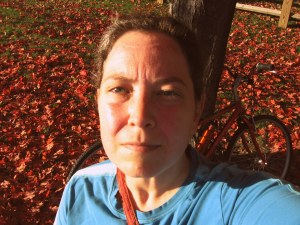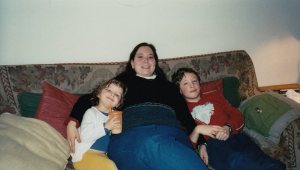“As psychoanalyst Erik Erikson once noted, there are only two choices: Integration and acceptance of our whole life-story, or despair.” ~From Ruthless Trust by Brennan Manning
I’ve been doing a new exercise lately, when difficult memories surface. I take a deep breath, and the in-breath represents full acceptance of myself and everyone in my past, my life story and theirs. Then I breathe out, and that represents letting go of the pain and trauma that I experienced, forgiving myself and others. Breathe in — acknowledge and accept; breathe out — let go.
In the spirit of accepting myself and acknowledging my whole life story, yesterday when I was posting some pictures from ten years ago I included a somewhat unflattering picture of myself — worthwhile because of my two adorable cousins.
I wanted to avoid the temptation to edit out parts of my life that I don’t like — like the fact that I was significantly overweight for most of my late twenties and early thirties. That was a part of me, and I can’t breathe out and forgive myself unless I breathe in and acknowledge it. I did so many fun things during that time, and it’s impossible to post pictures of them without showing that aspect of myself as well.
Eleven years later, I’m forty years old — about to turn forty-one. And I’m almost sixty pound lighter, and have been for several years. Significantly, I didn’t lose the weight by finding the perfect diet or exercise regime. I lost it by letting go of self-recrimination and shame. I lost it by forgiving myself each time I overate. I lost it by letting go of my identity as someone who was fatally flawed. After thirty-plus years of dieting, binge eating, and starving myself, I told myself that I wouldn’t diet anymore, that I would only have three rules for myself from now on:
1. Eat when you’re hungry.
2. Stop eating when you’re full.
3. Forgive yourself when you don’t.
For years I was stuck in a cycle of overeating, feeling shame because of it, trying to diet and exercise because I hated who I was, and then overeating again from that place of shame and hunger. I tried breaking the cycle over and over again, but I always tried to break it in the eating stage or the stopping stage. I finally realized after years and years that I needed to break the cycle in the shame stage. “Forgive yourself when you don’t.” That’s #3 on the list, but it’s the most important part.
I started out pretty well with “eat when you’re hungry” — not a simple thing when you have felt your most beautiful and affirmed when you were dieting or flat-out starving yourself. I bought healthy food and prepared it and tried to feed myself with as much love as I would feed a child, and with as much purpose as I put gas in my car. But the “stop when you’re full” part took a lot longer. The overeating had grown compulsive — sometimes the food just tasted so good, and I was getting such an endorphin rush from it that I couldn’t stop; but other times I was sick of eating, my jaw hurt from chewing, and the food tasted like sand, but something in me kept saying eat, eat, and I couldn’t stop.
That’s when I started pulling out my new rule, #3: “Forgive yourself when you don’t.” Instead of wallowing in shame and self-hatred, I got myself a drink of water, patted myself gently on the arm, and said, “That’s okay. You’re doing the best you can, and that’s a lot! Get a good night’s rest — tomorrow’s another day.”
It didn’t work overnight. In fact, without the shame and constant inner struggle I did gain weight at first. But gradually, slowly, I found myself eating and thinking, “Hm, I think I’m full,” and putting the food away. Without the shame the compulsion began to diminish. Eating became a thing to enjoy and be proud of — I was giving my body what it needed to live! Exercise flowed out of that joy. Instead of beating my bad flesh into line, I was enjoying the strength in my legs as I ran, and biked, and in my arms as I kayaked or did yoga. Shame got me short-term success and deeper longer-term problems. Forgiveness is healing me.
It was a long process, and I have far from mastered it. I still overeat occasionally. And I still am tempted to feel ashamed of myself. But then I remember how far I have come, and I pat myself gently and say:
You have done the very best you can, every step of the way. You have made mistakes, but you are forgiven. Accept yourself and your past, forgive yourself, and let it go. When you have learned to forgive yourself, it will be possible to forgive others for the times they have hurt you. Breathe in — it’s okay. Everything that has happened to you is part of your story — there’s nothing you need to deny or forget. It has all led here, and here is where you are supposed to be right now. Breathe out — Let it go. You are not defined by your pain or your mistakes, or the way others have hurt you. You can let go of all of it and live fully in the moment, and accept fully what this day and this moment have to offer you.
Friends, is it time to forgive yourself? Is it time to break the cycle and let go of your shame? Is it time to learn to feed yourself? Can you start tonight? — Pat yourself gently on the arm and say, “It’s okay! You did the best you could today, and that’s a lot!” Start tomorrow fresh, not needing to skip lunch to make up for today’s dessert, or to start a new diet because you had seconds at dinner. Wake up, not bad, not fatally flawed, just human. Wake up, forgiven and new, and feed yourself.
***
Come follow me on Facebook, Twitter, and Instagram and join in the conversation! (I’ll tell you a secret: I’m feistiest on Twitter!)
*Parts of this essay were originally posted last year as part of Momastery’s Messy Beautiful project.*


I thought your blog regarding baking cakes (“make them two”) was terrific. This one is terrific as well. As a 68-year old man was has been fat for more than 60 years, I recognize everything you’ve said, and I think your advice (or your method) is useful and applicable, as well as being simple enough to cover all our myriad individual issues. Good luck to you, and thank you.
LikeLiked by 3 people
Thank you. Thank you.
LikeLiked by 2 people
Thank you for sharing! The blame and guilt are the hardest things to get rid of.
LikeLiked by 2 people
so meaningful to me! thank you
LikeLiked by 2 people
Wow you amazed me by saying something I’ve been trying to figure out in my head. Thank you!
LikeLiked by 2 people
I really s*cked at this today.
LikeLike
Me, too.
LikeLike
Went back and read this again. The new, key idea here is your description of “breaking the cycle in the shame part.” Thank you!
LikeLiked by 2 people
Your generosity of spirit transcends the limits of words, blogs, internet, human frailty. I was born fat and have been fat my while life except those times I abused my body sufficiently to get kudos from friends, family, colleagues, and strangers. Even though I’ve fought for fat acceptance for decades, personally, publicly, and in print, I still fall back into self loathing. Your philosophy/practice/plan is beautiful and healing, whether or not pounds are shed. Thank you.
LikeLiked by 1 person
I love that you have decided not to edit out parts of your life just because they weren’t perfect. We all need to be more loving and forgiving of ourselves and others.
LikeLiked by 2 people
I probably need to print this out and hang it up. Always, always a battle.
Is it bad that I have been counting it as a plus side to my husband’s post-surgical maintenance schedule that I have lost a couple of pounds via bungling my way through days without enough sleep and spending more time on my feet than I have in forever? I’m afraid even that loss won’t last, once I sit down.
LikeLiked by 1 person
Look what your body can do! It is carrying you to the hospital and back, to physical therapy, to the kitchen to get drinks and snacks for your husband; it is hugging him, hugging your daughter, typing comments on Facebook and on blogs. Those legs, those arms, those fingers! Amazing.
LikeLiked by 1 person
Thank you. 🙂 Maybe I’m not giving it enough credit. I remain surprised that the fibro hasn’t felled me yet during all of this, at least not substantially. I have not hit that wall that says, “you’re not getting out of bed today, whether you like it or not.”
I have put this body through a lot more than it’s used to in the last couple of weeks, but I am happy to say that things have finally eased up a bit. The level of intensity has been dropping, and the “franticity,” as we call it around here, is also receding. Still a long haul ahead of us. Thanks for the kinds words.
LikeLiked by 1 person
Love it! The honesty, the truth, the choosing of yourself rather than the judgements! Love and hugs to you!! You are beautiful and authentic!! That is an accomplishment worthy of celebration!! Perfection is just a point of compareason, it is a decision not a reality! How it makes you feel is the clue! Love your openness and honesty, trust your body! You are beautiful! You are worthy!
LikeLiked by 1 person
Thank you so much, Paula!
LikeLike
This wouldn’t work for me because I can’t convince myself “You did the best you could” when I know perfectly well I didn’t. There are occasional days when I do the best I can, but most days I make choices that I know at the time are destructive and unhealthy. I don’t have to make them, nothing is compelling me, I just choose pleasure in the moment over satisfaction in the long term. I can forgive myself, but I can’t lie to myself and say, “You did the best you could.”
LikeLiked by 1 person
I hear that, definitely, Sarah. I think for me it’s not so much the specific words that are important, but that I have an attitude of grace towards myself, rather than judgement. The judgement may be accurate (though with issues of eating I feel like it is always more complicated than simply making a bad decision) but if it produces shame then that shame does more harm than all the sugar and salt and calories combined. Shame has helped me to get thin, but it has never helped me to get healthy.
LikeLike